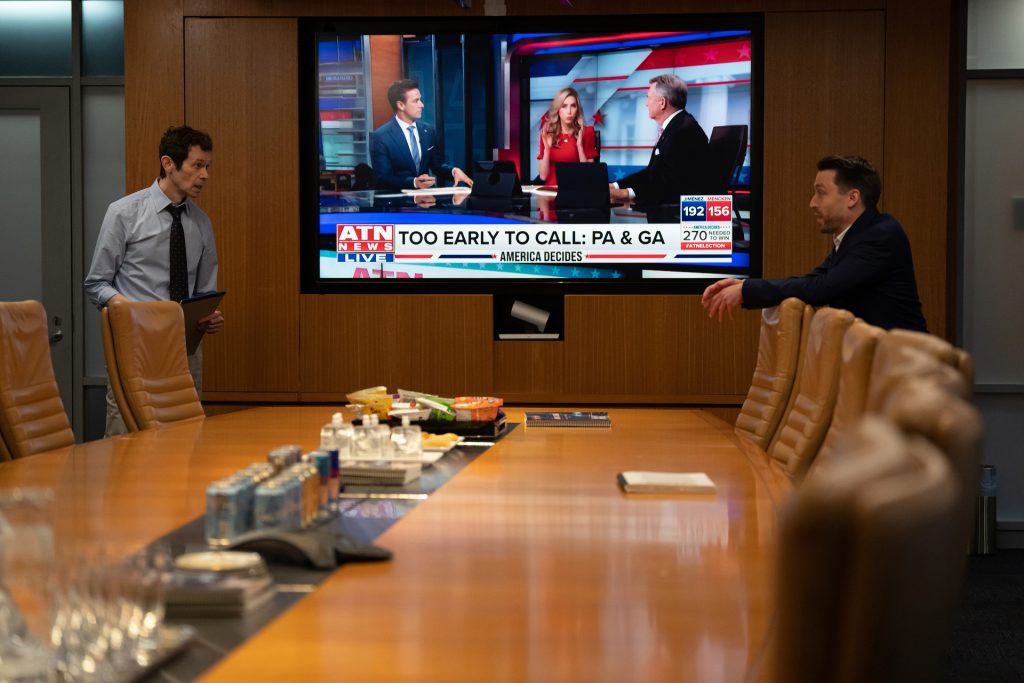An unexpectedly close presidential election is thrown into chaos after 100,000 ballots in Milwaukee go up in flames. And what was on those ballots will decide the next commander in chief.
It was a made for TV moment — literally. This week’s episode of the hit HBO drama “Succession,” which centers around a wealthy family of squabbling siblings jockeying for control of a media company, plays that scenario out over the course of an agonizing 65 minutes.
Massive spoilers ahead: Roman Roy, one of the two brothers at the helm of ATN — that fictional media company at the center of the show — seizes on that uncertainty in Wisconsin to project his preferred presidential hopeful as the next occupant of the White House. His sister, Shiv, freaked out by the political implications of it all, resists. Eventually, Kendall, the titular head of the crew, sides with Roman even with the situation on the ground in Milwaukee very much up in the air.
The episode leaves many things unresolved. But it also raises one nagging question: What would happen if something like this actually occurred? Here’s what the Emmys favorite show got right — and what the show got wrong.
Election officials would have a pretty good idea of which ballots were destroyed, but not for whom they were cast
In the show, ATN’s decision desk nerd tells the executives that election officials would have no idea which ballots were even lost. “While we theoretically know everyone who requested an absentee ballot, we don’t entirely know how many turned them in, and there’s nothing in Wisconsin law that really covers what to do,” said Darwin, who is played by Adam Godley.
That is wrong in one important aspect: If a massive batch of ballots were destroyed, Wisconsin election officials say they would have a pretty good idea of which ballots went missing.
“In this scenario, there is a record,” said Scott McDonell, the clerk of Dane County, Wis. (McDonell got hung up on the first season of the show, but didn’t mind getting spoiled to discuss the episode.) “They would have banked in [every one] of the ballots that were received.”
McDonell notes that the state has a fairly robust ballot tracking system, and unless ballots had just arrived at the central tabulation centers in Milwaukee, election officials would have a pretty good idea of which ballots went up in flames.
In the show, Darwin and Shiv, portrayed by Sarah Snook, argue that those ballots are almost assuredly overwhelmingly Democratic.
That’s true: Milwaukee is a blue bastion in Wisconsin. But without tabulation, nobody would know for sure if the margins in those 100,000 ballots would be enough to overcome the fictional Republican Rep. Jeryd Mencken’s lead.
Claire Woodall-Vogg, the real-life executive director of the Milwaukee Election Commission, said it was possible workers could have tried to grab the ballots during evacuation — while noting that could raise serious chain of custody questions — and said that officials may have been able to save memory cards with the results from ballots that have already been tabulated.
But, she added, she thought that local and state officials would both have “immediately requested a court order on Election Day not to transmit any election results until the courts figured out what to do.” Such a move would be to try to avoid the public fiasco depicted on the show of some — but not all — of the results being publicly released.
But after that, all bets are off
The ballots are gone, so what happens next? Lawsuits, almost assuredly. “It’ll get ground out in the courts, whatever we say,” said Jeremy Strong’s Kendall, who is trying to rationalize why he should side with Roman, played by Kieran Culkin, and make a call that Wisconsin has gone to Mencken.
He is right on that point: This would almost assuredly end up in litigation that would make Bush v. Gore look quaint by comparison, and we see both fictional campaigns rushing “SWAT teams” to Wisconsin to get prepared for the coming legal battle.
“As the episode played out in Wisconsin, the law doesn’t say what to do, so it would certainly go to the courts,” said Barry Burden, the director of the Elections Research Center at the University of Wisconsin-Madison.
But, Burden said, he thought a judge “would be extremely likely to grant some kind of accommodation,” like reaching out to voters whose ballots were burned up to give them the opportunity to recast a ballot. Wisconsin law, he notes, allows for voters to spoil ballots pre-election if they would like to, and the fictional scenario depicted in Wisconsin could be an extension of that.
Timing is also a big question. Shiv repeatedly mentions election certification in the episode, but that’s something that happens days or weeks — not hours — after polls close.
Despite some claims in the show this would take “months” to be resolved in courts, there is an outer bound on timing: “It would be resolved before the electoral college vote happened in December in the state capitals, and definitely before the Jan. 6 meeting of electors in D.C.,” Burden said, referring to two key points in the process that would have to act as an endpoint to legal proceedings.
As for the presidential electors: The Bipartisan Policy Center’s Michael Thorning notes that recent revisions to the Electoral Count Act better defines what happens after a “failed election,” but states need to update their procedures to define what qualifies their emergency procedures to kick in — like 100,000 ballots going up in smoke.
The real-life planning behind the scenes of “Succession”
Sunday’s episode of Succession is, thankfully, fictional. But there is some crossover between real life and HBO in this case.
“I lie awake at night, especially during general elections, thinking about how to secure our ballots,” Woodall-Vogg said. “How to make sure they’re in a room that has sprinklers so that maybe you can salvage ballots, things like that.”
Woodall-Vogg consulted for the show before last fall’s midterm election, and said that answering their questions was a good planning exercise should disaster strike in a real election. But, she joked, “they gave me a different scenario when they were talking to me, because they probably knew that I have a big mouth.”
Election officials do have real emergency plans in place to try to deal with the unforeseen, from natural disasters to intentional sabotage — especially given all the attention that has been on the process of elections over the last decade.
Wisconsin may have been an inspired pick for the Succession showrunners, not just because it is a high-stakes swing state.
McDonell notes that election officials in Wisconsin put that emergency planning to use when they had to prepare for potential tornados during this year’s April election. “We were all battening down the hatches and we were talking about chain of custody, what to do, how to shut down your polling place, how to secure your ballots just so that we don’t have problems like that,” he said.







